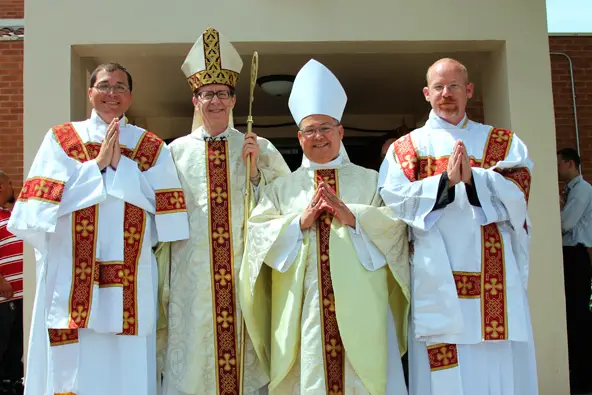Catholic facts
Differences and Similarities between Bishop and Deacon
Within the hierarchical structure of the Christian Church, two distinct yet vital roles are that of Bishops and Deacons. These roles, marked by their responsibilities, ordination processes, and areas of service, play a significant part in the spiritual life of the Church. In this comprehensive exploration, we will delve deep into the differences and similarities between Bishops and Deacons, shedding light on their roles, functions, and significance within the Christian community.
Bishops: The Spiritual Overseers
Definition: Bishops are high-ranking clergy members in various Christian denominations, known for their spiritual authority and leadership. The term “Bishop” is derived from the Greek “episkopos,” signifying an overseer. Bishops are typically responsible for the spiritual guidance of multiple congregations, often within a specific geographic region known as a diocese.
Ordination: To become a Bishop, one must undergo a special consecration that includes the laying on of hands by other Bishops. This ordination sets them apart for their distinctive role within the Church.
Responsibilities:
- Spiritual Oversight: Bishops are the spiritual overseers of their dioceses or regions. They provide guidance, leadership, and pastoral care to the clergy and congregations under their authority.
- Church Governance: Bishops play a crucial role in the governance of the Church. They have authority in matters of doctrine, discipline, and church administration within their diocese.
- Ordination and Confirmation: Bishops are responsible for ordaining new clergy and administering the sacrament of confirmation, a rite of initiation into the Church.
- Episcopal Vestments: Bishops are often distinguished by their distinct vestments, including the mitre (a pointed headdress), a crosier (a shepherd’s staff), and other regal attire.
Deacons: The Servants of the Community
Definition: Deacons are clergy members within the Christian Church, serving in a diaconal role that emphasizes service and assistance. The term “Deacon” is derived from the Greek “diakonos,” meaning servant. Deacons are often seen as a bridge between the laity and the clergy.
Ordination: Deacons undergo a unique ordination process that sets them apart for their service role. They may be transitional Deacons who intend to become Priests, or permanent Deacons who remain in this role throughout their ministry.
Responsibilities:
- Service to the Community: Deacons have a particular focus on service to the community. They are often involved in charitable work, assisting the needy, and helping with social and pastoral services.
- Liturgical Role: Deacons assist in liturgical ceremonies by proclaiming the Gospel, preparing the altar, and performing various liturgical duties. They serve as intermediaries between the clergy and the congregation.
- Preaching and Teaching: Some Deacons are involved in preaching and teaching, conveying the Christian message and doctrine to the congregation.
Differences Between Bishops and Deacons
- Scope of Authority: The most significant difference lies in the scope of authority. Bishops oversee a diocese or region, holding significant spiritual authority. Deacons do not have the same level of authority and focus on service and assistance.
- Ordination Process: Bishops undergo a specific episcopal ordination that sets them apart as overseers. Deacons undergo a diaconal ordination that emphasizes their service role.
- Spiritual Oversight: Bishops provide spiritual oversight to multiple churches and congregations within their diocese. Deacons are not responsible for spiritual oversight but focus on service and assisting with the liturgy.
Similarities Between Bishops and Deacons
- Ordination: Both Bishops and Deacons undergo a form of ordination that marks their roles as clergy within the Church.
- Service to the Community: While their roles differ significantly, both Bishops and Deacons serve the Christian community in various capacities.
Conclusion
Bishops and Deacons, while serving distinct roles within the Christian Church, are bound by their commitment to the spiritual well-being of the faithful. Bishops serve as spiritual overseers, providing guidance and leadership to multiple congregations. Deacons, on the other hand, embrace a service-oriented role, assisting the Church and community in various ways. This distinction highlights the multifaceted nature of the Church’s ministry, emphasizing spiritual leadership and service as essential components of Christian life. Both roles are integral to nurturing the faith and spirituality of the Christian community, embodying the Church’s mission to serve and guide believers on their spiritual journey.
About Author
























